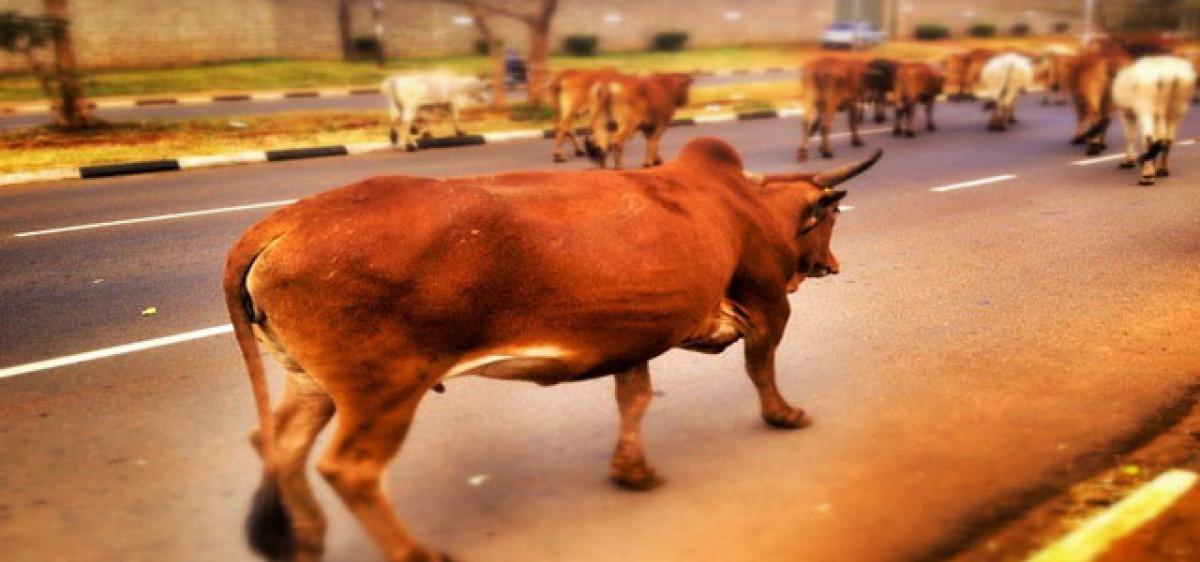Live
- Six Useful Strategies to Control Your Heart During the Pollution Season
- Phalodi Satta Bazar Predicts Close Race in Maharashtra Assembly Election 2024
- Federer Pays Heartfelt Tribute to Nadal Ahead of His Retirement: "An Epic Career"
- Odisha holds successful mega investors roadshow in Singapore
- PGTI Tour: Top stars to fight for honours in Servo Masters Golf
- SC upholds termination of LIC employee for absenting himself without intimation
- ‘Stone me or shoot me, won’t spare anyone,’ says Anil Deshmukh after discharge
- Siddaramaiah, Shivakumar turning Karnataka into Pakistan: K’taka BJP
- Zimbabwe records 70 suspected cholera cases, one death amid new outbreak
- Babri demolition day: No Assembly proceedings in Bengal on Dec 6
Just In

Besides the legality and morality of policing the food habits in a diverse society, the central government notification imposing selective ban on sale of cattle for slaughter has grave implications that went unaddressed while issuing such a controversial order.
Besides the legality and morality of policing the food habits in a diverse society, the central government notification imposing selective ban on sale of cattle for slaughter has grave implications that went unaddressed while issuing such a controversial order.
The ban that regulates animal markets would have serious impact on agrarian economy and meat industry affecting the livelihoods of large sections of society. Meat is the main source of protein food for poorer sections. Depriving them of this without ensuring alternative nutrition will have implications for nutritional security of the poor.
Prohibition of cattle slaughter and regulation of cattle trade will significantly impede the supply of raw material for the leather industry displacing a large number of poor workers for whom no alternative livelihoods were planned before effecting the ban. It is estimated that more than 2.5 million people are employed in India’s leather industry among whom dalits constitute the most.
Besides, large numbers of people are also employed in meat processing and export sector, whose livelihoods are also in peril due to the ban order. Even the farmers, especially the small and the marginal who own 50 per cent of India’s cattle population, will have to bear the unfair burden of caring for useless cattle.
The Constitution empowers the states to frame policies on such issues. The unilateral order of Centre despite objections from several state governments infringes on the federal structure of India.
The central government that showed remarkable alacrity in pandering to so-called sentiment by ensuring bull fights, now, justifies its order in the name of cruelty towards animals.
In fact, in most states cow slaughter is already banned. The new regulations extend this to some more animals. Why cruelty towards fish, hen, goats, and sheep, pigs etc., should be permitted. Why can’t the Centre ban the trade in them too?
If the Centre is really serious in regulating cattle sales, it should prevent agrarian distress which forces farmers to sell their cattle to slaughter houses. The central government should at least purchase cattle from drought-stricken distressed farmers to avoid animal slaughter. The governments are not even ensuring timely and adequate supply of fodder. There are instances of farmers raising debts to feed the cattle during drought.
The arbitrary rules also encourage animal vigilantism and harassment of farmers and other cattle owners in the name of enforcing the central order.
Estimates suggest that animal husbandry accounts for 7.35 per cent of the country’s GDP and 26 per cent of the agricultural GDP in India. Around 30 per cent of the farmers’ household income comes from cattle and cattle products.
The animal slaughter is not a religious issue. It is an agrarian issue. The ban would also significantly increase the animal population, thereby putting enormous strain on the resources and the environment.
The government before embarking upon such notification should have studied and addressed the economic implications of such an order. No government can impose such a burden on the peasant economy and the livelihoods of people without putting in place an alternative action plan to compensate.

© 2024 Hyderabad Media House Limited/The Hans India. All rights reserved. Powered by hocalwire.com







